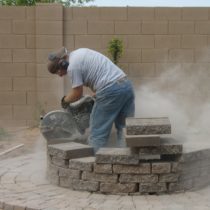Landscape Architecture for Landscape Architects › Forums › GENERAL DISCUSSION › Mass Transit Rail
- This topic has 1 reply, 4 voices, and was last updated 16 years, 11 months ago by
 Will Blair.
Will Blair.
-
AuthorPosts
-
February 17, 2009 at 9:48 pm #175120
 Clayton MunsonParticipant
Clayton MunsonParticipantI’ve been thinking the last couple days about mass transit. It started when I read a blog about Charlotte, NC, and what the mayor has done there with promoting light rail. No albeit this is more of a local focus blog but it got me thinking about nation wide transit. Also with all this talk (and now the signing) of the stimulus bill the is supposedly focus partially on rebuilding the highway system. Why is it that the US has been so slow in producing a national mass transit system similar to that of the Eurorail? Think about it. . . governments own wide strips of land all along the highways. What if they were to take that land and build a rail system in that area. I know we have Amtrak but lets face it, it really has done very well. Everywhere I have lived the closest station was hours away meaning I had to drive myself or take a bus to the station only to take the train to a destination that is in the opposite direction of where I would want to go, not to mention the amount of time required to get from point A to point B even on the train. Example I can drive from where i live now in AZ to my home town in IL in the same amount of time as it takes to take the train.
February 17, 2009 at 10:42 pm #175126 Will BlairParticipant
Will BlairParticipantlooks like there are some plans down the road…or track:
http://www.treehugger.com/files/2009/02/obama-high-speed-railroad.phpFebruary 18, 2009 at 4:45 am #175125 Claudia ChalfaParticipant
Claudia ChalfaParticipantRail is definitely going to become more important in America in the future. Although as someone pointed out we are very spread out here, this is becoming less and less so, particularly on the east and west coasts. As fuel prices continue to go up, and urban areas become more dense, light rail and commuter projects like the one in Charlotte are going to become much more common. The fact is, many of the small towns in America began as railway stops. When cars took over as the principal form of transportation, many of these little towns just disappeared. This is very evident all over the south, and probably in other places as well. It would be great to revitalize some of those little towns by linking major cities with commuter rails. There is already a plan for linking Charlotte to Atlanta, from what I understand.
February 18, 2009 at 4:33 pm #175124 Clayton MunsonParticipant
Clayton MunsonParticipantThere is no worse mistake than to design for what we hope to be true and ignore what we know to be true. There seems to be a growing philosphy that is preaching doing just that and expecting different results.
I only partly agree with this statement. Yes we do need to take into account the “existing real need”, but I think we also need to provide a solution looking forward. At what point do the effects of expanding a highway become higher than that of building a rail system. If we continue to expand highways we just allow for more cars to be on the road. Andrew said mass transit “will thrive in areas where driving and parking are a pain in the neck”. If roads are continually expanded will that point be reached. I live in Phoenix where there has been talk for several years about the possible construction of a 14 lane super highway through the center of phoenix (I-10). Will that ever become a “pain in the neck” for drivers. . .
They just opened a new light rail system here as well and ridership has already exceeded the expectations.
As far as those “techniques” that you listed. I feel that it is important to know those in order that at some point in the future we will be able to “break the mold” of current design processes. Nothing will ever change if someone doesn’t take the initiative to make that change and inform others. Many developers, not to mention the consumers, don’t even know what Zero-lot-line, new urbanism, or co-housing mean.
There was a comment made earlier about the United States being so spread out. I view that as a reason as to why high speed rail systems should be promoted and implemented. It would then be possible to live in those rural areas and commute 200 miles to work in a larger city with out losing anytime . I guess I’m thinking that a plan for both inner city mass transit and high speed interstate rail need to be looked at as a viable option instead of focusing available funds on repairing/expanding the existing highway system.
Picture this . . . your driving down the highway in Texas, a state that never seems to end, and you see a train pass you going 200mph. Would you consider taking that train the next time you made the trip and rent a car at your destination. If you feel like you must have a car to travel around your destination.
February 18, 2009 at 5:11 pm #175123 ncaParticipant
ncaParticipantHere in northern Colorado many citizens have long awaited a mass transit system to connect front range cities like Fort Collins, Loveland, Longmont, Denver, and Boulder along a +/- 60 mile corridor. The demand certainly hasn’t caused legislators and developers to take action. The most viable options, in the opinion of CDOT and others involved, is a second highway 20 miles further east paralleling I25.
I think this situation is a good example of where stick-in-the-mud legislation (lagislators) get in the way of real progress which has a real demand and real solution. Heck, we don’t even have a regular bus line that runs to Denver from northern Colorado towns. Every morning thousands of people get in their cars and inch down the highway to work in Denver. Its almost laughable.
Still, I agree with the notion that you can’t manufactre a demand that doesn’t exist, but there certainly are places that express the demand and somehow we keep doing the same old, same old.
February 18, 2009 at 5:14 pm #175122 ncaParticipant
ncaParticipantClayton,
I wish I could live in
AndoverVermont and work in Boston.February 18, 2009 at 6:14 pm #175121 Clayton MunsonParticipant
Clayton MunsonParticipantI realize there is a difference between HSR and Mass transit.
I’m not saying that the highways should be demolished. I understand that there are other uses and reasons for the highways. Yes military is one of them. They were designed such that a bombers could safely land on stretches of the highway. However other that in the heartland those possibilities have been greatly reduced due to encroachment of development overpasses/underpasses. Also to move tanks across the country. Freight traffic is one of the greatest uses of the highway.
There are other ways and for lack of a better term more “sustainable” way to move those good. Freight trains, CSX has recently started promotions for it’s train line stating that one train can move 1 ton of freight 423 miles per gallon of fuel. Seems pretty good compared to the 9mpg 40 ton semi.
The example of commuting 200 miles was to show that it would be possible for people to do so. Many people spend 1hr of commute to travel 30 miles. It’s possible that someone could take that same one hour and travel 200 miles.
I’m considering some of the possibilities of a transit system that combines HSR, Mass transit, and car/bus.
It will be a VERY long time before cars are replaced, but I’m not saying it won’t happen. We will still need roads to connect the transit hubs whether it’s a mass transit station, HSR station, or a freight yard. But, if the amount of vehicle traffic making those long distance trips is reduced I would call it a success. Some jobs don’t allow for a worker to take mass transit, but if those that don’t need access to a vehicle through out the day use mass transit that will improve travel for everyone. There would be less traffic congestion, therefore vehicles would be spending less time sitting in traffic spewing pollution into the air.
I also realize there is a high initial cost. What new technology doesn’t have a high initial cost? Hydrogen cars would require stations through out the US to upgrade. E85 still hasn’t spread like it was predicted. Electric cars have limited ranges per charge. I mean come on scientist are doing studies to see if it’s possible to build a tunnel between NYC and London, or building a bridge from Africa to Spain.
-
AuthorPosts
- You must be logged in to reply to this topic.


